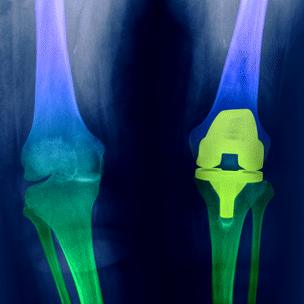Total knee replacement implants evidence is 'lacking'
- Published

Most knee replacement operations are for patients with osteoarthritis
More evidence on the long-term safety, patient satisfaction and effectiveness of total knee replacements is needed, according to researchers.
The operation replaces damaged knee joints, mostly from arthritis, with an artificial joint.
However, researchers writing in the Lancet said the range of implants had "proliferated" without full testing.
The UK regulator said the National Joint Registry was a "key source" of safety and performance data.
Recently there have been concerns over implanted medical devices such as PIP breast implants and metal-on-metal hip replacements. Arguments for better "surveillance" of implants has been a common theme.
The researchers have not identified a health risk with total knee replacements. However, they said it was important to establish "long-term monitoring" of the implants.
One of the researchers Prof Andrew Carr, from the University of Oxford, told the BBC: "We're not sitting on a metal-on-metal situation, but there could be something not being picked up as there are not the processes going on for monitoring [total knee replacements]."
He said the number of implants available had "substantially proliferated" with 30-40 models now available from at least 15 manufacturers.
However, he said this was "often with little or no evidence of effectiveness or cost-effectiveness" and that the regulations needed to be tougher and "more along the lines of introducing new drugs".
'Monitor experiences'
The Medicines and Healthcare products Regulatory Agency said there were more than 80,000 knee joint replacements in the UK in 2010 and that safety data was collected.
Its clinical director, Dr Susanne Ludgate, said: "The National Joint Registry (NJR) is a key source of information on the long-term safety and performance of knee joint replacements and is the largest such registry in the world.
"The NJR assists surgeons in making choices and regulators in monitoring performance.
"Since April 2003 all knee joint replacement operations in England and Wales have been recorded in the NJR."
Prof Carr said data from the NJR showed up no health concerns, but there was a need to also monitor patients' experiences better such as changes in pain levels and ability to move.
The medical director of Arthritis Research UK Prof Alan Silman said: "Given the current concerns raised by the metal-on-metal hip replacements - although there is no evidence that there are similar implications for knee replacements - it's appropriate to take stock of the advantages and costs of knee joint replacement.
"Undoubtedly it produces major benefits for patients and the need will be become greater as the population ages and becomes more obese.
"However it's equally important that we are able to understand and measure the benefits of surgery, and we are currently supporting research to measure the benefits to patients in a more effective way, and also to predict who should have the operation, and when."
- Published5 March 2012
- Published17 January 2012
- Published5 April 2011
- Published15 July 2010
- Published6 March 2012